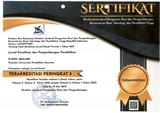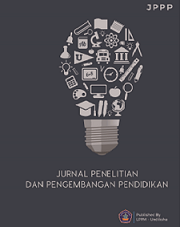The Differences between Using Quizizz Interactive Quiz And LiveWorksheet in Math Problem Solving Ability
DOI:
https://doi.org/10.23887/jppp.v6i2.48883Keywords:
Problem Solving Skill, Interactive Quiz, MathematicAbstract
The problem in this research is the lack of students' ability to solve problems and the lack of use of interactive quizzes in learning. The purpose of this study is to analyse differences in the ability of students to solve math problems with Quizizz interactive quizzes and Liveworksheets. This research uses a quantitative research type using a Quasi Experiment approach. The data collection in this study used interviews and a problem-solving ability test in the form of open essay questions. This study sample is two class devided into an experimental class that will apply the Quizizz interactive quiz and an experimental class that will apply the interactive Liveworksheet quiz. The data analysis of this research was started by using validity test, reliability test, discriminatory power test, difficulty level test, normality test, homogeneity test, and hypothesis testing on Post-Test questions. The results showed Post-Test data using the Liveworksheet interactive quiz, the average score obtained was 22.8, while the class using the Quizizz interactive quiz had an average of 19.4. It can be concluded that the Liveworksheet interactive quiz is better than the one using the Quizizz interactive quiz, because it can make it easier for students to use it when understanding the material and working on essay questions, besides that students are more enthusiastic about working on questions because they are competing to get the highest score, and students are able to develop mathematical problem solving to improve their way of thinking.
References
Antara, P. A. (2019). Implementasi Pengembangan Karakter Anak Usia Dini dengan Pendekatan Holistik. JIV-Jurnal Ilmiah Visi, 14(1), 17–26. https://doi.org/10.21009/jiv.1401.2. DOI: https://doi.org/10.21009/JIV.1401.2
Asria, L., Sari, D. R., Ngaini, S. A., Muyasaroh, U., & Rahmawati, F. (2021). Analisis Antusiasme Siswa Dalam Evaluasi Belajar Menggunakan Platform Quizizz. Alifmatika: Jurnal Pendidikan Dan Pembelajaran Matematika, 3(1), 1–17. https://doi.org/10.35316/alifmatika.2021.v3i1.1-17. DOI: https://doi.org/10.35316/alifmatika.2021.v3i1.1-17
Dewi, K. M. S. (2018). Kontribusi Disiplin Belajar dan Motivasi Berprestasi Terhadap Hasil Belajar Matematika. Jurnal Penelitian Dan Pengembangan Pendidikan, 2(2), 152. https://doi.org/10.23887/jppp.v2i2.15397. DOI: https://doi.org/10.23887/jppp.v2i2.15397
Djannah, M., Zulherman, & Nurafni. (2021). Kahoot Application for Elementary School Students: Implementations of Learning Process from Distance during Pandemic period of COVID 19. Journal of Physics: Conference Series, 1783(1). https://doi.org/10.1088/1742-6596/1783/1/012121. DOI: https://doi.org/10.1088/1742-6596/1783/1/012121
Dwyer, C. P., Hogan, M. J., & Stewart, I. (2014). An integrated critical thinking framework for the 21st century. Thinking Skills and Creativity, 12(1), 43–52. https://doi.org/10.1016/j.tsc.2013.12.004. DOI: https://doi.org/10.1016/j.tsc.2013.12.004
Elita, G., Habibi, M., Putra, A., & Ulandari, N. (2019). Pengaruh Pembelajaran Problem Based Learning dengan Pendekatan Metakognisi terhadap Kemampuan Pemecahan Masalah Matematis. Mosharafa: Jurnal Pendidikan Matematika, 8(3), 447–458. https://doi.org/https://doi.org/10.31980/mosharafa.v9i3.517. DOI: https://doi.org/10.31980/mosharafa.v8i3.517
Fitrah, M., & Ruslan, R. (2020). Eksplorasi Sistem Pelaksanaan Evaluasi Pembelajaran di Sekolah pada Masa Pandemi Covid-19 di Bima. Jurnal Basicedu, 5(1), 178–187. https://doi.org/10.31004/basicedu.v5i1.639. DOI: https://doi.org/10.31004/basicedu.v5i1.639
Fitriani, N., Hidayah, I. S., & Nurfauziah, P. (2021). Live Worksheet Realistic Mathematics Education Berbantuan Geogebra: Meningkatkan Abstraksi Matematis Siswa SMP pada Materi Segiempat. JNPM (Jurnal Nasional Pendidikan Matematika), 5(1), 37–50. https://doi.org/10.33603/jnpm.v5i1.4526. DOI: https://doi.org/10.33603/jnpm.v5i1.4526
Hidayat, W., & Sariningsih, R. (2018). Kemampuan Pemecahan Masalah Matematis Dan Adversity Quotient Siswa SMP Melalui Pembelajaran Open Ended. Tubercle and Lung Disease, 2, 109. https://doi.org/10.33603/jnpm.v2i1.1027. DOI: https://doi.org/10.33603/jnpm.v2i1.1027
Hidayatullah, Z., Wilujeng, I., Nurhasanah, N., Gusemanto, T. G., & Makhrus, M. (2021). Synthesis of the 21st Century Skills (4C) Based Physics Education Research In Indonesia. JIPF (Jurnal Ilmu Pendidikan Fisika), 6(1), 88. https://doi.org/10.26737/jipf.v6i1.1889. DOI: https://doi.org/10.26737/jipf.v6i1.1889
Kartika, T. (2019). Manajemen Pembelajaran Tahfidz Al-Qur’an Berbasis Metode Talaqqi. Jurnal Isema : Islamic Educational Management, 4(2), 245–256. https://doi.org/10.15575/isema.v4i2.5988. DOI: https://doi.org/10.15575/isema.v4i2.5988
Khikmiyah, F. (2021). Implementasi Web Live Worksheet Berbasis Problem Based Learning dalam Pembelajaran Matematika. Pedagogy: Jurnal Pendidikan Matematika, 6(1), 1–12. https://doi.org/10.30605/pedagogy.v6i1.1193. DOI: https://doi.org/10.30605/pedagogy.v6i1.1193
Kowiyah, & Mulyawati, I. (2018). An Analysis of Primary School Students’ representational Ability in Mathematics Based on Gender Perspective. Journal of Physics: Conference Series, 948(1). https://doi.org/10.1088/1742-6596/948/1/012016. DOI: https://doi.org/10.1088/1742-6596/948/1/012016
Lubis, E. (2018). Efektivitas Penggunaan Model Pembelajaran Talking Stick Terhadap Kemampuan Pemecahan Masalah Matematis Siswa di Kelas VIII MTs YPKS Padangsidimpuan. Jurnal MathEdu, 1(3), 32–39. http://journal.ipts.ac.id/index.php/MathEdu/article/view/571.
Malik, R. S. (2018). Educational Challenges in 21st Century and Sutainable Development. Journal of Sustainable Development Education and Research, 2(1), 9–20. https://doi.org/10.17509/jsder.v2i1.12266. DOI: https://doi.org/10.17509/jsder.v2i1.12266
Marshel, J., & Ratnawulan. (2020). Analysis of Students Worksheet (LKPD) integrated science with the theme of the motion in life using integrated connected type 21st century learning. Journal of Physics: Conference Series, 1481(1). https://doi.org/10.1088/1742-6596/1481/1/012046. DOI: https://doi.org/10.1088/1742-6596/1481/1/012046
Mustafa, P. S., Gusdiyanto, H., Victoria, A., & Masgumelar, N. kukuh. (2020). Metodelogi Penelitian Kuantitatif, Kualitatif, dan Tindakan Kelas dalam Pendidikan Olahraga. Fakultas Ilmu Keolahragaan Universitas Negeri Malang.
Noor, S. (2020). Penggunaan Quizizz dalam Penilaian Pembelajaran pada Materi Ruang Lingkup Biologi untuk Meningkatkan Hasil Belajar Siswa Kelas X.6 SMA 7 Banjarmasin. Jurnal Pendidikan Hayati, 6(1), 1–7. https://doi.org/https://doi.org/10.33654/jph.v1i1.927.
Pramitasari, K., Usodo, B., Subanti, S., Magister, P., Matematika, P., Sebelas, U., & Surakarta, M. (2019). Proses Pembelajaran Matematika Untuk Siswa Slow Learner Di Kelas Inklusi Smp Negeri 7 Klaten Kelas Viii. Jurnal Elektronik Pendidikan Matematika, 3(7), 777–786. https://jurnal.fkip.uns.ac.id/index.php/s2math/article/view/6494.
Prastika, Y., & Masniladevi. (2021). Pengembangan E-LKPD Interaktif Segi Banyak Beraturan dan Tidak Beraturan Berbasis Liveworksheets Terhadap Hasil Belajar Peserta Didik Kelas IV Sekolah Dasar. Journal of Basic Education Studies, 4(1), 4–14. https://www.ejurnalunsam.id/index.php/jbes/article/view/3817.
Purba, L. S. L. (2020). The Effectiveness of the Quizizz Interactive Quiz Media as an Online Learning Evaluation of Physics Chemistry 1 to Improve Student Learning Outcomes. Journal of Physics: Conference Series, 1567(2), 16–20. https://doi.org/10.1088/1742-6596/1567/2/022039. DOI: https://doi.org/10.1088/1742-6596/1567/2/022039
Purba, T. N., Pangaribuan, F., & Hutauruk, A. J. (2022). Pengembangan LKS Pembelajaran Matematika Realistik Berbasis Etnomatematika dengan Konteks Gonrang Sipitu Pitu Simalungun pada Materi Geometri Bangun Ruang Tabung. Jurnal Basicedu, 6(3), 4686–4700. https://doi.org/https://doi.org/10.31004/basicedu.v6i3.2873. DOI: https://doi.org/10.31004/basicedu.v6i3.2873
Purnama Sari, D., Wahyu Yunian Putra, R., & Syazali, M. (2018). Pengaruh Metode Kuis Interaktif Terhadap Kemampuan Pemecahan Masalah Matematis Mata Kuliah Trigonometri. Jurnal Pendidikan Matematika, 12(2), 63–72. https://core.ac.uk/download/pdf/267822151.pdf.
Rahayu, N. D., Zulherman, & Yatri, I. (2021). Animated Video Media Based on Adobe After Effects (AEF) Application: An Empirical Study for Elementary School Students. Journal of Physics: Conference Series, 1783(1), 012116. https://doi.org/10.1088/1742-6596/1783/1/012116. DOI: https://doi.org/10.1088/1742-6596/1783/1/012116
Rhosyida, N. (2021). Mengoptimalkan Penilaian dengan Liveworksheet pada Flipped Classroom di SD. Taman Cendekia, 05(01), 568–578. https://doi.org/10.30738/tc.v5i1.9749. DOI: https://doi.org/10.30738/tc.v5i1.9749
Roskaputri, F., Mardiyana, M., & Fitriana, L. (2021). Pengembangan E-Modul Matematika Menggunakan Liveworksheets Sebagai Bahan Pembelajaran Mandiri pada Masa Pandemi Covid-19. AKSIOMA: Jurnal Program Studi Pendidikan Matematika, 10(4), 2029–2039. https://doi.org/10.24127/ajpm.v10i4.4331. DOI: https://doi.org/10.24127/ajpm.v10i4.4331
Rostika, D., & Junita, H. (2017). Peningkatan Kemampuan Pemecahan Masalah Siswa SD dalam Pembelajaran Matematika dengan Model Diskursus Multy Representation (DMR). EduHumaniora : Jurnal Pendidikan Dasar, 9(1), 35–46. https://doi.org/10.17509/eh.v9i1.6176. DOI: https://doi.org/10.17509/eh.v9i1.6176
Sadikin, A., & Hamidah, A. (2020). Pembelajaran Daring di Tengah Wabah Covid-19. Biodik, 6(2), 109–119. https://doi.org/10.22437/bio.v6i2.9759. DOI: https://doi.org/10.22437/bio.v6i2.9759
Sari, K. W. S. (2020). Pengembangan Modul Materi Segiempat Berbasis Kemampuan Pemecahan Masalah pada Peserta Didik Kelas VII SMP Negeri Secang Tahun Ajaran 2019/2020. Universitas Sanata Dharma.
Sele, A. (2022). Survei Kepuasan Siswa Mengerjakan Tugas dengan Aplikasi Live Worksheet pada Pembelajaran Daring. Ideguru: Jurnal Karya Ilmiah Guru, 7(1), 53–60. https://doi.org/10.51169/ideguru.v7i1.311. DOI: https://doi.org/10.51169/ideguru.v7i1.311
Sugiyono. (2018). Metode Penelitian Kuantitatif. Alfabeta.
Sulistiyowati, Y. E., Susiaty, U. D., & Oktaviana, D. (2021). Pengembangan Buku Ajar Elektronik Interaktif (BAEI) Berbantuan Google Slide dan Quizizz dalam Meningkatkan Kemampuan Pemecahan Masalah pada Materi Relasi dan Fungsi di Kelas VIII SMP Negeri 1 Kubu. JUWARA: Jurnal Wawasan Dan Aksara, 1(2), 143–155. http://jurnal.smpharapanananda.sch.id/index.php/juwara/article/view/26.
Suryani, M., Jufri, L. H., & Putri, T. A. (2020). Analisis Kemampuan Pemecahan Masalah Siswa Berdasarkan Kemampuan Awal Matematika. Mosharafa: Jurnal Pendidikan Matematika, 9(1), 119–130. https://doi.org/10.31980/mosharafa.v9i1.605. DOI: https://doi.org/10.31980/mosharafa.v9i1.605
Widiyanti, A. (2021). Pengembangan Bahan Ajar E-LKPD Menggunakan Live Worksheet Pada Materi Bangun Datar Kelas IV Sekolah Dasar. Eprints UMM, 20.
Wulandari, D., & Suwardana, O. (2020). Perbedaan Hasil Belajar Matematika Siswa melalui Media Penilaian Berbasis Online Menggunakan Aplikasi Quizizz dan Google Form pada Materi Matriks. Jurnal Stkip Kusuma Negara, 114–126. http://jurnal.stkipkusumanegara.ac.id/index.php/semnara2020/article/view/478.
Yana, A. U., Antasari, L., & Kurniawan, B. R. (2020). Analisis Pemahaman Konsep Gelombang Mekanik Melalui Aplikasi Online Quizizz. Jurnal Pendidikan Sains Indonesia, 7(2), 143–152. https://doi.org/10.24815/jpsi.v7i2.14284. DOI: https://doi.org/10.24815/jpsi.v7i2.14284
Downloads
Published
How to Cite
Issue
Section
License
Copyright (c) 2022 Mutiara Azzahra, Kowiyah

This work is licensed under a Creative Commons Attribution-ShareAlike 4.0 International License.
Authors who publish with the Jurnal Penelitian dan Pengembangan Pendidikan agree to the following terms:
- Authors retain copyright and grant the journal the right of first publication with the work simultaneously licensed under a Creative Commons Attribution License (CC BY-SA 4.0) that allows others to share the work with an acknowledgment of the work's authorship and initial publication in this journal.
- Authors are able to enter into separate, additional contractual arrangements for the non-exclusive distribution of the journal's published version of the work (e.g., post it to an institutional repository or publish it in a book), with an acknowledgment of its initial publication in this journal.
- Authors are permitted and encouraged to post their work online (e.g., in institutional repositories or on their website) prior to and during the submission process, as it can lead to productive exchanges, as well as earlier and greater citation of published work. (See The Effect of Open Access)







